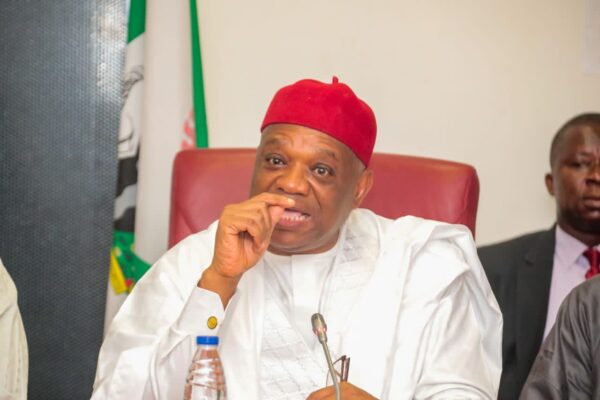*CBN, Angola’s apex bank sign technical cooperation agreement
Ndubuisi Francis in Abuja
The federal government has thanked the World Bank for designating Nigeria as a priority country to help showcase a Universal Health Coverage (UHC) COMPACT, as well as selecting Nigeria to lead efforts under the Africa Initiative for Access to Medicines and Local Manufacturing (AIM 2030).
The Universal Health Coverage COMPACT
is a coordinating mechanism to align and pool financial resources for national health priorities.
The Minister of State for Finance, Dr. Doris Uzoka-Anite expressed Nigeria’s appreciation at the Health Works Leaders Coalition roundtable on the sidelines of the ongoing 2025 World Bank/IMF Annual Meetings in Washington D.C., United States of America.
This came as the Central Bank of Nigeria (CBN) and the Bank of Angola also signed a Memorandum of Understanding (MoU) for bilateral technical cooperation.
The agreement, which was signed by the CBN Governor, Olayemi Cardoso, and his counterpart from the Central Bank of Angola, Mr. Manuel Antonio Tiago Diaz, is expected to promote knowledge exchange, improve regulatory coordination, and enhance capacity in the execution of central banking functions.
World Bank’s designation of Nigeria is part of its support for the country’s efforts to achieve universal health coverage, as seen in the approval of new financing operations like the HOPE-PHC programme to improve primary healthcare.
At the Health Works Leaders Coalition roundtable, Uzoka-Anite highlighted the progress made in Nigeria’s health sector, as the federal government’s macroeconomic reforms continue to yield positive results.
She noted that despite challenges, the health sector has witnessed significant improvements, with increased funding and strategic initiatives aimed at enhancing healthcare delivery.
While acknowledging that there is still a significant funding gap in the health sector, she, however, noted that the federal government increased allocation to the Federal Ministry of Health and Social Welfare by almost 60 per cent in the 2025 appropriation.
The minister also highlighted the government’s efforts to boost financing and deepen value in the health sector, including the design, administration, and periodic review of Excise Tax on tobacco, alcohol, and sugar-sweetened beverages, with revenue from these excise taxes earmarked for Universal Health Coverage (UHC).
She added that the government has implemented a policy zero-rating medical equipment and drugs for Value Added Tax (VAT) purposes and secured concessionary financing in excess through the HOPE operation.
The minister underscored the need for a national compact to serve as a coordinating mechanism to align or pool fiscal resources toward national priorities, particularly in the health sector, and thanked the World Bank for recognizing Nigeria as a priority country for showcasing its UHC COMPACT and for selecting Nigeria to lead efforts under the Africa Initiative for Access to Medicines and Local Manufacturing (AIM 2030).
She reiterated the government’s commitment to advancing reforms and promoting sustainable growth, with a focus on improving the lives of Nigerians.
While expressing optimism about Nigeria’s economic prospects, she called for continued support and partnerships to drive growth, productivity, and equitable development.
Uzoka-Anite commended the Ministry of Health under the leadership of Prof. Ali Pate, and other relevant stakeholders, for their collaborative efforts in driving progress in Nigeria’s health sector.
This achievement, she said, “is a testament to President Bola Ahmed Tinubu’s Renewed Hope Agenda, which prioritizes improving the nation’s health and well-being.”
Also,
Also, speaking at the agreement signing event with Angola, moderated by the CBN Deputy Governor (Economic Policy), Dr. Mohammed Sani Abdullahi, and attended by senior officials of both banks, the CBN Governor, Mr. Olayemi Cardoso, described the MoU as a “timely and significant milestone” in fostering regional cooperation among African central banks.
He noted that the agreement had been in the works for some time and reflected the growing understanding that collaboration was essential to addressing Africa’s shared economic challenges.
“This forum brings together a multiplicity of stakeholders and interests from across the globe, and what we’ve done today highlights the spirit of cooperation that defines these annual meetings.
”Cardoso emphasised that the pact was in line with the CBN’s strategy to promote regional stability, support cross-border financial integration, and build institutional resilience across Africa.
“This agreement gives us the opportunity to strengthen regional understanding, share experiences, and build a more interconnected and robust financial system,” he added.
Speaking earlier, the CBN Deputy Governor (Economic Policy), Dr. Muhammad Sani Abdullahi, explained that the MoU provides a structured framework for both central banks to share knowledge, technical expertise, and supervisory information.
He said the objectives of the agreement included establishing a bilateral platform for reciprocal exchange of technical assistance, enhancing capacity development, and fostering collaboration in the supervision of financial institutions that operate across borders.
Abdullahi outlined several key areas of cooperation under the MoU, including exchange control, management of financial markets and foreign reserves, currency management, economic research, and monetary and financial statistics.
Others include payment systems, financial sector development, banking regulation, cybersecurity, anti-money laundering and counter-financing of terrorism (AML/CFT), and staff training.
He also highlighted the agreement’s focus on ensuring a transparent and smooth exchange of information between the two central banks, particularly in the licensing, ongoing supervision, and resolution of cross-border financial establishments.
“The cooperation will strengthen our capacity to manage systemic risks and ensure stability in our financial sectors.
“It also provides a platform for shared learning and innovation in central banking operations,” Abdullahi said.
In his remarks, the Governor of the Bank of Angola, Mr. Manuel Tiago Dias, described the MoU as an important step toward building stronger financial ties between the two countries and, by extension, among African nations.
He observed that both central banks share common objectives of promoting macroeconomic stability, developing efficient payment systems, and safeguarding their financial sectors against global vulnerabilities.


